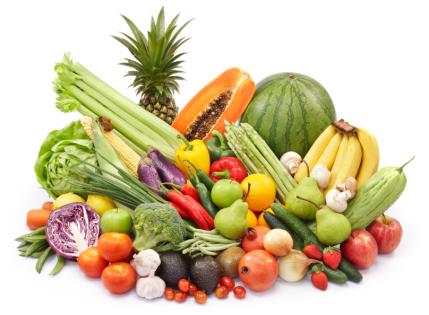A 12-year study by the University College London (UCL) has found that eating large quantities of fruit and vegetables significantly lowers the risk of premature death. People who ate at least seven portions of fruit and vegetables each day were 42% less likely to die from any cause over the course of the study.
The study also found that:
- vegetables are four times healthier than fruit
- canned and frozen fruit lowered risk by 25%, and
- fruit juice has no significant benefit.
Most countries follow the World Health Organisation’s recommendation of five servings of fruit and vegetables a day, but barely one-third of people in rich nations even manage to eat that amount. The five-a-day guidelines were developed in 1990, and recommend consuming 400g of fruit and vegetables each day to lower the risk of heart disease, stroke, type-two diabetes and obesity.
The findings of this new study lend support to the official Australian Government Dietary Advice of “2+5” a day, which encourages people to eat two helpings of fruit and five of vegetables. But it still isn’t enough for some experts who, on the basis of this study, are advocating 10 serves as the optimum number because the protective effect increases with higher consumption.
The researchers found that seven helpings a day of fruit or vegetables could reduce a person’s overall risk of premature death by 42% when compared with people who ate just one whole portion. People who ate between five and seven portions a day had a 36% reduced risk of death, those who ate three to five portions had a 29% decreased risk and those who ate one to three helpings had a 14% reduced risk.
Those with the highest intakes were also 25% less likely to die from cancer and 31% less likely to die from heart disease.
“The clear message here is that the more fruit and vegetables you eat, the less likely you are to die at any age. My advice would be however much you are eating now, eat more,” says the study’s lead author, Dr Oyinlola Oyebode of the UCL’s department of epidemiology and health.
The study also found that vegetables were far more beneficial than fruit. Each portion of vegetables lowered the risk of death by 16%, while each piece of fruit only lowered the chance of death by 4%.
Professor Simon Capewell of the department of public health at Liverpool University advocates 10 portions a day.
“Humans are designed to be omnivorous: a handful of nuts, seeds, fruit and the occasional antelope. We’re not meant to be eating junk food.”
The study is one of the largest of its kind, examining the eating habits of 65,000 people in England between 2001 and 2013.
The study was published in the Journal of Epidemiology and Community Health.



















__small.png)










